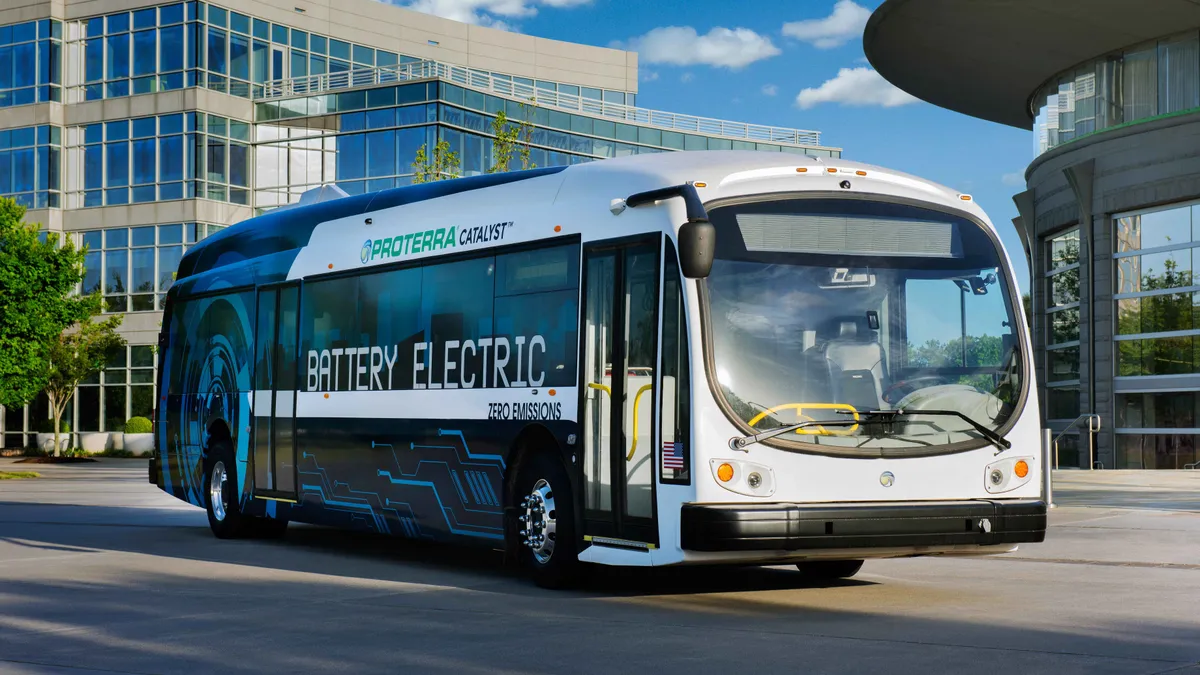Dive Brief:
- A coalition of 35 California mayors submitted comments today to the California Air Resources Board (CARB) in support of accelerating the transition to 100% zero-emission buses, which the proposed Innovative Clean Transit (ICT) measure aims to do by 2040.
- The mayors represent nearly 25% of the state's population, and several of the transit agencies serving them have already signed on to their own 100% electric bus fleet goals. However, a state-wide measure would help transition California's entire fleet of transit buses, Jimmy O'Dea, senior vehicles analyst at Union of Concerned Scientists, told Utility Dive.
-
The letter, written by representatives from UCS and the Californians for Zero Emissions Vehicles coalition, had twice the amount of mayoral support from the start of the year. The initiative was prepared ahead of CARB's public hearing on the ITC on Sept. 27.
Dive Insight:
CARB is expected to vote on the ITC in September, which could lead to another historic clean energy mandate for the state after the California Energy Commission passed a requirement earlier this year for rooftop solar on all new residences after 2020.
Increased demand for power from the extra electric buses is expected to provide a boost in power demand for utilities. But buses are just one part of the EV equation. At the end of May, the California Public Utilities Commission approved plans by the state's three largest utilities to invest nearly $740 million in charging infrastructure across the state for electric vehicles and trucks.
Besides the infrastructure build-out, the state helps get electric buses on the road through its low carbon fuel standard and its use of revenue from California's carbon cap-and-trade program to give transit companies a purchase incentive for electric buses. The CARB proposal would be the latest regulatory push to help make an electrified transit fleet economically feasible for the state.
"The state is doing really everything to make electric buses a financial win for transit agencies," Jimmy O'Dea, electric vehicles policy analyst at UCS, told Utility Dive.
California is currently allowed to establish its own fuel efficiency standards for vehicles. While that ability has been threatened by the Trump administration, the state could enact a clean transit rule without a waiver from a federal standard.
Already, 12 transit agencies in the state have committed to 100% emissions-free bus fleets. The map below shows (with green markers) 8 of the 35 mayors that signed the letter come from municipalities that are served by transit agencies with 100% emission-free transit goals, such as Los Angeles and San Francisco. The rest of the mayors (blue markers) come from municipalities whose transit agencies have not fully established that goal yet. That's where a statewide ITC policy would come in.
SOURCE: CalZEV (data), Iulia Gheorghiu (map)
The ITC is very conservative by not accelerating the retirement rate of existing traditional bus fleets, O'Dea said. The proposal would let any non-electric buses already purchased by transit agencies to continue operation. The ITC would direct agencies to make 25% of transit purchases zero emissions buses starting in 2023, and 100% starting in 2029.
However, the proposal includes a credit for transit agencies like Oakland's AC Transit that already have fuel cell buses on the road, which will count toward that 2023 target.
"It’s rewarding the early actors," O'Dea said.














